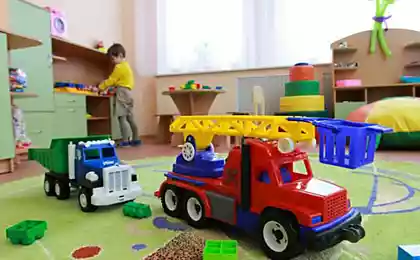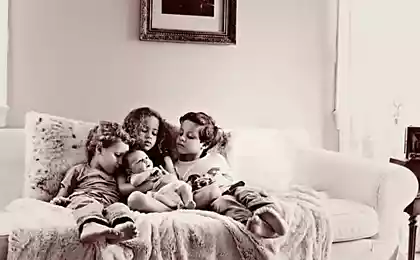566
How to talk to kids about money
This should be taught in school, but for some reason not taught. Let's see how to explain to children what this animal is — money.
Not long ago I was in a completely new situation for yourself. A girl of five years, in the education which I participate, came up and asked very seriously: Tamara, where did the money come from?I began to happily explain (give money for the work, and so on), and after a few days instead of "Daddy, buy ice cream," she said, "Dad, why don't you go to work, earn money and buy me ice cream". That is, the value of the labor of others the girl is not yet understood, but what I told her, absorbed instantly. Personally, I was amazed.

Money is one of those fundamental pieces, which for the most part we are studying "casually", but if this approach worked, nobody would have read articles about financial planning on our website, right? And many smart uncle and aunts every month would not ask: "Where is my salary?".The ability to handle money is one of the few skills that will be useful to absolutely everyone, so to fill this gap in the existing education system will have you.
Two rulesAll the time. First, children of different ages need to tell. The three-year plan to anything to know about taxes. Teenager without you know that the money you get at work. Second, the information must come dosed with enough breaks to the baby is fully absorbed. Otherwise he will be feeling once school requirement. Hence the second rule. The best learning format. Or promote mutual understanding. It works for all ages, but especially children. Game — their natural state, so no need to tear a child away from interesting classes and put opposite to talk about money. Than spontaneous and relaxed are your lessons, the better. With 3 to 5 yearsLesson # 1. Money can buy thingsHow to teach:
And remember that the meaning of all these lessons not only educational. Many adults are afraid of money, I feel for them disgust and distrust. They say, "money can't buy happiness," and like to blame society for the pressure to "be rich" that it supposedly has. On the other hand are those who make money from the cult. They say: "Not in money happiness, and in their number," and go buy it... I don't know. The tenth yacht.
You lessons, games and, most importantly, the personal example can show your son or daughter that money is a tool for the good life. They give the opportunity to choose (Turkey or Carpathians taxi or subway, to cook or order) and delight yourself, give protection and stability. Money should be respected and to multiply. Even love, but without fanaticism. As a friend, not as a deity.
And no, the happiness of some of the money to build, but this would be much easier if money is no problem. Want this for your child? Start today.
Maybe you have already talked with your child about money? What was it like? Have you noticed the progress after these conversations? If you want to boast of what you have smart kids, now is the time. :) posted
P. S. And remember, only by changing their consumption — together we change the world! © Join us at Facebook , Vkontakte, Odnoklassniki
Source: lifehacker.ru/2015/11/11/children-and-money/
Not long ago I was in a completely new situation for yourself. A girl of five years, in the education which I participate, came up and asked very seriously: Tamara, where did the money come from?I began to happily explain (give money for the work, and so on), and after a few days instead of "Daddy, buy ice cream," she said, "Dad, why don't you go to work, earn money and buy me ice cream". That is, the value of the labor of others the girl is not yet understood, but what I told her, absorbed instantly. Personally, I was amazed.

Money is one of those fundamental pieces, which for the most part we are studying "casually", but if this approach worked, nobody would have read articles about financial planning on our website, right? And many smart uncle and aunts every month would not ask: "Where is my salary?".The ability to handle money is one of the few skills that will be useful to absolutely everyone, so to fill this gap in the existing education system will have you.
Two rulesAll the time. First, children of different ages need to tell. The three-year plan to anything to know about taxes. Teenager without you know that the money you get at work. Second, the information must come dosed with enough breaks to the baby is fully absorbed. Otherwise he will be feeling once school requirement. Hence the second rule. The best learning format. Or promote mutual understanding. It works for all ages, but especially children. Game — their natural state, so no need to tear a child away from interesting classes and put opposite to talk about money. Than spontaneous and relaxed are your lessons, the better. With 3 to 5 yearsLesson # 1. Money can buy thingsHow to teach:
- Ask your child to help you count the coins. Explain the values. When the coins will understand, go for paper money.
- In the store, buying something for the baby (ice cream, juice, something small), invite him / her to dial the desired amount.
- Play store: decompose the beautiful clothes, toys, shoes, cars (depending on the sex of the child), print out toy money and offer him to be a first seller and then buyer.
- When something good happens (e.g., a girlfriend came to visit your daughter), note that it is a joy for which it is not necessary to pay. In other words, show that it is not all pleasant for sale.
- When the child again asks: "daddy, Daddy, what are you doing?", while you are working at the computer, tell him about their work: what are your responsibilities for what you pay, why you appreciate and respect.
- On the street, passing people in uniform (waiters, outdoor cafe, police), point at them and ask who it is. "What do you think, what do they do? Why do we need their work?" Tell the daughter, clinging to a beautiful showcase that all-all these dolls are the property of the owner of shop and that she is the owner.
- The road will offer to play "I want to work (job title)". The winner is the one who will come up with more.
- When a child expects something pleasant (holiday, free swing), recall that sometimes you have to wait before you get a welcome.
- Get a cute piggy Bank and give the child a coin every time he something be able or when you something helps. Every month or two open the piggy Bank. Say, "See how much had accumulated! I also have a piggy Bank for big purchases". And then let him buy with his own money what he wants.
- Make cards with pictures of different shopping and encourage your child to sort them into two piles: "want" and "need".
- Store ask what's more important to buy: food (meat, cheese, fruit and so on) or chocolate. When the child (of course) choose chocolate, recall that asked about the importance, not just nice. Tell me, what chocolate is for pleasure, but eating them alone is impossible.
- Draw together a chart that you divide into sections by types of purchases. Food, home goods, entertainment and so on. Demonstrate that money is not infinite and it is important correctly to distribute.
- If you have decided to buy a child a toy, put it next to ("Want to choose where to buy, together with you"), and together poterpite online stores to find the best price.
- In the store tell me that this is "our budget for fruit", and offer to choose which to buy.
- Show on the price tag with the discount and explain what it is.
- If a child wants something very expensive, show him the chart that you did, what piece from your budget this purchase is "eat".
- When you stumble (and he will definitely stumble) on the locked content in a game on the tablet, explain that he asked for money and that the money is absolutely real, even if they are not visible.
- Sign a contract that without your permission, your child will not be entering any personal information on the Internet ("Shh, don't tell the Internet my secrets").
- Know what sites your child visits.
- Take your child with you to the Bank in a not very crowded day. Answer all the questions.
- Show your plastic card and tell us why it started.
- Tell us about savings accounts. Open free savings account for a child.
- Invite a child to defer (in the same piggy Bank or open account) 10% pocket money. And praise, if he will do it.
- Make a mood Board (mood board — "mood Board") with photos and price tags of inexpensive things that a child wants to buy himself. Offer once a month to choose a new target mudbone and save for it.
- Maintain the attachment of the child: generally speaking, for every ruble in the Treasury or to the account from his report to 25 cents from myself.
- Show the account statement or sum up the balance of the piggy Bank, the child is seen as a growing amount.
- Sit together and do the math (practice math, by the way), how much your son or daughter Skopje to 50 years if it is to defer each year a certain amount.
- Show by example how the credit card works and how it differs from the usual "plastic" ("You take from me 50, return 10, but in the end do not pay 50, but...").
- Give examples of when you used a credit card (or took credit), and tell us why it was justified.
- Play with your child in the online game model Free-to-play and the moment to explain how in-app purchases, why are they so alluring and why they should be avoided.
- If your child is already in your email, tell us about the spam and discipline not to open emails from unknown person.
- Tell us about the SMS scams that are urgently asked to send money for the phone and so on.
- Explain the concept of personal data (room dad's credit card to the email address or physical address) and tell that stranger they are not intended.
- Show with concrete figures (with visual diagrams or infographics), how much you earn and where the money goes. How much is housing in your town, how much we spend on food per day and per month, how much clothing, transportation, entertainment, school supplies.
- Advise the child to write down (at least in Notepad, at least in application), where does his pocket money. Can offer extra rewards, but the best non-monetary. For example, the right to walk with friends late once a week. Keep in mind that even with the reward chances that the child will really to record expenses, the minimum, if you do not.
- Invite a child to receive a salary for housework, assistance with shopping, paying the bills (let taste the beauty of the queues in the savings Bank), or pet care. And it is a salary every month, and not a quick pocket for each day.
- Together look for temporary job for the summer. If you find something interesting, discuss how the child will be to get hired: interview practice, write each cover letter and compare your options.
- Tell us about remote work, its pluses and minuses.
- Now the card is necessary for all: it makes life easier. Fear is not necessary. The sooner the child it will be, the faster he'll learn to use it wisely. Get an additional card on your account, put you her comfortable limit (not more than X per day, for example) and handed the child. Tell me that this is only his personal money is his money, quite real. Everything you talked about personal data and the value of paper money, applies here.
- Show the example of some of the planned purchase, how to use the card online, at ATM in the store. If you pay your child for work or just give pocket, give the choice, as he could get them: cash or card. Or split in half. Teach him to fill up the card yourself in the proper ATM or terminal.
- Follow the expenses of the child so that you are not caught. You give your child money so he learned to use them responsibly. If he senses your lack of confidence (even justified), the effect will be counterproductive. Either you learn responsibility, but also give reasonable freedom, or freedom is not given, but independence is not waiting. There is no other way.
And remember that the meaning of all these lessons not only educational. Many adults are afraid of money, I feel for them disgust and distrust. They say, "money can't buy happiness," and like to blame society for the pressure to "be rich" that it supposedly has. On the other hand are those who make money from the cult. They say: "Not in money happiness, and in their number," and go buy it... I don't know. The tenth yacht.
You lessons, games and, most importantly, the personal example can show your son or daughter that money is a tool for the good life. They give the opportunity to choose (Turkey or Carpathians taxi or subway, to cook or order) and delight yourself, give protection and stability. Money should be respected and to multiply. Even love, but without fanaticism. As a friend, not as a deity.
And no, the happiness of some of the money to build, but this would be much easier if money is no problem. Want this for your child? Start today.
Maybe you have already talked with your child about money? What was it like? Have you noticed the progress after these conversations? If you want to boast of what you have smart kids, now is the time. :) posted
P. S. And remember, only by changing their consumption — together we change the world! © Join us at Facebook , Vkontakte, Odnoklassniki
Source: lifehacker.ru/2015/11/11/children-and-money/























